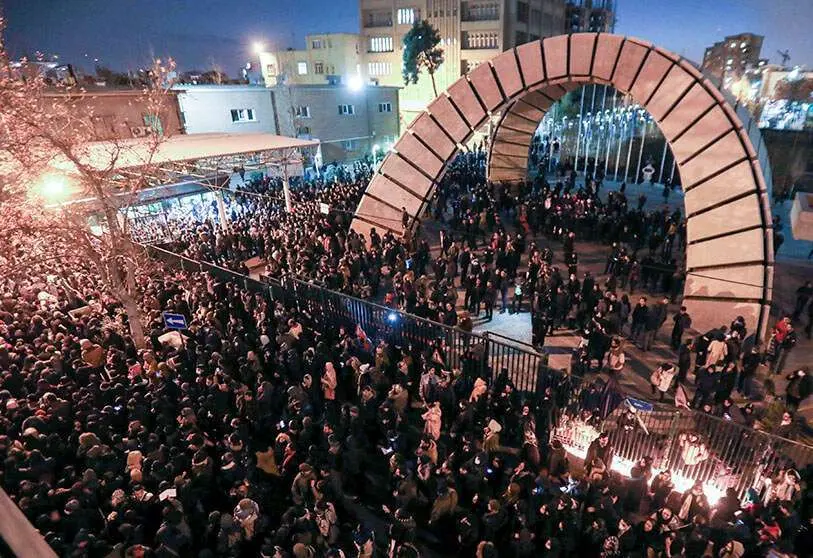Latest protests reaffirm the need for real US Support of the Iranian people

Large-scale protests in Iran have entered their second week, following the clerical regime's decision to cut food subsidies, causing the price of various staples to increase by as much as 300 percent. This is while tens of billions of public funds are diverted to support the regime’s nuclear weapons program and regional meddling. The regime has once again demonstrated its detachment from the dire needs of Iran’s people, leading countless citizens to once again call for the ouster of the entire theocratic dictatorship.
The current unrest is reminiscent of what happened in the wake of sharp increases in gasoline prices in November 2019. At the time, the uprisings spread to nearly 200 cities and towns. Protesters chanted “death to the dictator” and explicitly rejected the regime’s propaganda that portrays economic hardships as consequences of US-led sanctions, rather than endemic state corruption and mismanagement. A popular chant is "the enemy is right here, they [the regime] lie when they say it's America."
Since then, the problems plaguing Iranian society have only worsened. Inflation is out of control, hovering around 50 percent, with equal percentage of Iranians unemployed. Prices of basic staples have skyrocketed and there is no solution insight. Chants of “death to Khamenei, death to Raisi” echoed in at least seven provinces. Predictably, a terrified regime reacted with force, opening fire on protesters, killing at least five and wounding dozens.
The Iranian opposition has called the international community to react.
The international community can expand sanctions and diplomatic isolation of the regime, in accordance with Chapter 7, Article 41 of the United Nations charter. The dossier of Tehran’s human rights violations and terrorist activities should be referred to the UN Security Council, potentially setting the stage for prosecutions by the International Criminal Court.
On Monday, former Secretary of State Mike Pompeo traveled to Albania and visited the headquarters of the largest organized resistance, the Mujahedin-e Khalq (MEK). He met with Mrs. Maryam Rajavi, the resistance’s president-elect, and discussed the situation in Iran. In a speech delivered to thousands of MEK members in Ashraf 3, Albania, Mr. Pompeo said that a key missing piece in US policy on Iran has been engagement of the main Iranian Resistance.
"To correct the Iran policy, no matter who is in the White House, it is a necessity for the U.S. administration to reach out to the Iranian Resistance and take advantage of its tremendous capabilities," the former Secretary of State said in his speech.
As a sign of the MEK's capabilities inside Iran, the organization has set up small teams of “Resistance Units”, which lead anti-regime activities and organize major protests across the country. They have also disrupted state TV and radio and broadcast anti-regime slogans and excerpts of speeches by Mrs. Rajavi in major thoroughfares.
The people’s response to the MEK's calls for revolt is all the more impressive in light of the fact that Tehran cracked down fiercely on the November 2019 uprising, killing 1,500 people and arresting thousands of others. As the current unrest was emerging, there were widespread reports of Iranian authorities cutting off access to the internet, leading many experts to warn that renewed crackdowns would most likely follow. The protests continued to grow stronger all the same, and are still doing so now, even as the first reports of new killings begin to circulate.
It is not too late for the international community to prevent the current situation from turning into another massacre on the scale of the 2019 mass shootings. The US and its allies must exert much greater pressure on the regime right now, and the United Nations must take concrete steps to demonstrate that Tehran will no longer enjoy impunity for its past, current and future crimes. It must be held accountable, period.
The Iranian regime has long relied on the violent suppression of growing pro-democracy sentiment as a pillar of its rule. The international community must begin setting policies that reflect an understanding of that situation, and thus make it clear to Tehran that its existing strategy is no longer functional. Other policymakers should echo Mike Pompeo’s declaration to his hosts at Ashraf 3: “In the end the Iranian people will have a secular, democratic, non-nuclear Republic.”
If the US and its allies make that goal explicit, the Iranian people will realize it a lot sooner and with far less bloodshed than has followed previous uprisings.

